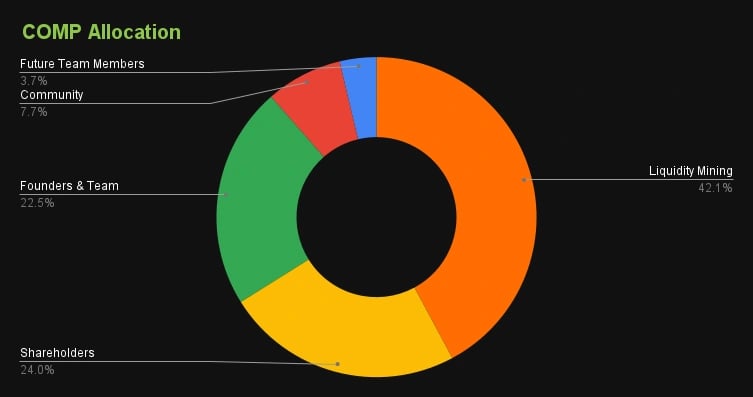위키 구독하기
Share wiki
Bookmark
COMP
0%
COMP
COMP는 Compound 프로토콜의 커뮤니티 거버넌스를 가능하게 하는 ERC-20 토큰입니다. 이 프로토콜은 사용자가 변동 이자율로 Ethereum 토큰을 공급하고 빌릴 수 있도록 하는 분산형 이자율 시장으로 구성됩니다. COMP 보유자는 프로토콜 변경 사항에 대해 토론하고, 제안하고, 투표할 수 있습니다. [1][2]
개요
COMP를 통해 보유자는 자신의 주소를 포함한 모든 주소에 투표권을 위임할 수 있으며, 위임자의 투표권은 소유자의 토큰 잔액 변경 시 자동으로 업데이트됩니다. Compound 프로토콜은 COMP 토큰, 거버넌스 모듈 및 Timelock의 세 가지 구성 요소로 구성되며, 이들은 함께 cToken의 관리 기능을 통해 변경 사항의 제안, 투표 및 구현을 용이하게 합니다. 이러한 제안은 시스템 매개변수를 수정하거나, 새로운 시장을 도입하거나, 완전히 새로운 프로토콜 기능을 통합할 수 있습니다. [2]
배포
Compound의 COMP 토큰은 1천만 개의 토큰으로 고정된 공급량을 가지고 있습니다. 이 중 42%는 일일 할당량을 통해 사용자에게 할당됩니다(자세한 내용은 방출 섹션 참조). [3]

나머지 토큰은 다음과 같은 방식으로 다양한 이해 관계자에게 배포됩니다. 대출 플랫폼과 토큰을 추진하는 회사인 Compound Labs는 24%를 받습니다. Compound 설립자 및 직원은 약 22%를 받습니다. 거의 8%가 프로젝트 거버넌스 참가자에게 할당되고, 약 4%가 미래의 Compound 직원을 위해 예약됩니다. [3]
방출
매일 약 1,822개의 COMP 토큰이 프로토콜 사용자에게 할당됩니다. 이러한 토큰의 배포는 ETH, USDC, DAI 등과 같은 다양한 시장에 할당됩니다. 토큰 할당은 거버넌스 프로세스를 통해 COMP 토큰 보유자가 결정합니다. 각 시장 내에서 배포는 공급자와 차용자 간에 동일하게 분할됩니다. [1]
사용 사례
COMP 토큰 보유자는 제안에 투표하고 새로운 제안을 제안하여 거버넌스에 참여할 수 있습니다. 이러한 제안은 이자율 설정, 새로운 자산 추가, 프로토콜 관리자 선택과 같은 다양한 주제를 다룹니다. COMP의 주요 목적은 거버넌스입니다. 보유자는 투표권을 위임하고, 제안을 논의하고, 투표할 수 있습니다. 거버넌스 시스템은 투명하며 각 주소가 보유한 투표권을 표시합니다. 새로운 거버넌스 아이디어를 제안하려면 개인은 COMP 토큰의 최소 1%를 주소에 위임하고 실행 가능한 코드를 제공해야 합니다. 이러한 제안은 3일간의 투표 기간을 거치며, COMP 보유자는 제안에 찬성하거나 반대하거나 기권할 수 있습니다. 찬성표가 400,000표 이상인 제안은 프로토콜 및 시스템 매개변수를 수정하는 스마트 계약인 Timelock으로 전달됩니다. Timelock은 제안 코드를 실행하기 전에 최소 2일의 지연 시간이 있습니다. 지연 시간이 지나면 제안이 구현됩니다. [4]
잘못된 내용이 있나요?
